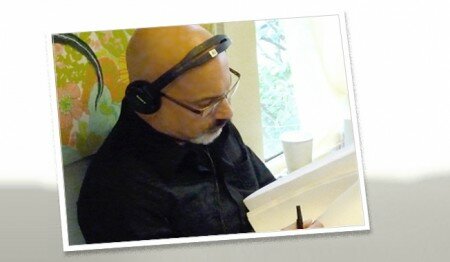
.
David Cress’ career as a producer encompasses commercials, music videos, documentaries, and independent features (PARANOID PARK, RESTLESS, SOME DAYS ARE BETTER THAN OTHERS). Now, with PORTLANDIA, he is moving into television. His company, Food Chain Films, came out of a business plan scribbled on napkin. David was born and raised in Portland.
.
Anne Richardson: So your first job in film was?
.
.
Anne Richardson: Paid internship?
.
David Cress: It was unpaid for three months, and then at the end of that three month period, Odyssey hired me, and I stayed there for about a year.
.
Anne Richardson: You were out of school?
.
David Cress: Yes. I had gone to Portland State and then for a couple years kind of kicked around. Trying to do things that could give me a taste for what I would do best. I worked for a law office, kept a law library and did some billing. And I did some lobbying work, and worked for a brokerage firm, stock brokerage. So I looked at law, I looked at finance, and I looked at politics and lobbying, and I didn’t really like any of them. And at the time, a guy whose brother I went to high school with was working on DRUGSTORE COWBOY as a second AD (Assistant Director). And he would come and we would go have dinner, or have drinks, and he would tell us about what he was doing on the set, and it would interest me. It sort of re-kindled the fantasy that I had in high school of being involved in filmmaking. When he did it, I thought, “If he can do it, I can do it.” I went down to Powell’s, and to the library, and I started reading the few pieces that were available about how to become a filmmaker.
.
Anne Richardson: This is in the early 90’s?
.
David Cress: Yes, and in the late 80’s. At the time, I had a girlfriend who was going to Reed, and so a lot of the people that I’d be standing at that section of Powell’s with would be these Reed-y guys. That was a real confidence breaker because I knew how hard those guys worked and how smart they were. I was very dubious of my chances of success. We’d all be in the same little two-foot section at Powell’s looking for the one book that was like, “How to become a filmmaker.”
.
Anne Richardson: This was during a surge of independent filmmaking, right?
.
David Cress: Yeah, KOIN Center had just been built. Susan Shadburne had made a movie (SHADOWPLAY, 1986). And I’d seen Penny Allen’s movie (PAYDIRT, 1981) at the 5th Avenue Cinema. So it didn’t seem a million miles away, with those couple of things. Will Vinton’s movie (THE ADVENTURES OF MARK TWAIN, 1985) had come out, or maybe that was a little later, but I saw that at the Guild Theater.
.
Anne Richardson: That came out the same exact year as SHADOWPLAY. (Apology! I thought this was true. I was wrong. Both films were made at Will Vinton Studios, they were released a year apart.)
.
David Cress: So, I was aware that it was a possibility. So at the reference library there was a book on best schools to go to. The Northwest Film Center, some place that had a video program in Olympia, and Mt. Hood Community College, were the schools listed. Mt. Hood was the most economically available, so I went up there and took classes. I was lucky that there was, funded through, I believe, cable franchises, an associates degree offered in Cable & Community TV, so I took a dual major in Television Production, and in Cable & Community TV. Cable & Community TV was really interested in activism and First Amendment rights, and your ability to make things and contribute and counter the big broadcast media. They basically taught a 16mm single camera operation. The text was Primer for Film, the same book everyone was using if you went to NYU or whatever. I still use stuff that I learned in that one class, every day. I use mostly nothing else.
.
Anne Richardson: Do you remember your teacher?
.
David Cress: Jack Schommer. He’s still there. The other really influential teacher I would say is Bushra (Azzouz). I took her doc class from the recommendation of another filmmaker in Portland.
.
Anne Richardson: At the Northwest Film Center?
.
David Cress: Yeah. Marc Greenfield was working as the equipment person at the Film Center. (Greenfield is now an award winning cinematographer & commercial director.) He told me that I should take Bushra’s class if I like doc, and I did and I loved her class. So those are my two influential teachers in film, besides all the mentoring, all the on the job sort of training.
.
Anne Richardson: Thank you, David.
.
========================================================
.
Note from Anne: David gave Oregon Movies, A to Z a longer interview, generously detailing his Portland-centric journey from stockbroker to filmmaker. I plan to post in the interview in its entirety in the future.
.
To deepen your understanding of David Cress’ place in Portland film history, consult Portland Monthly’s handy Film Family Tree.

0 responses so far ↓
There are no comments yet...Kick things off by filling out the form below.
Leave a Comment